Oscar nominee Sarah Polley: ‘This could’ve been the big year for Black female directors but it wasn’t: this is still a problem in the Academy’
The Canadian director is up for two Academy Awards, including Best Picture, for ‘Women Talking,’ a fable about patriarchal oppression and the power of women’s imagination
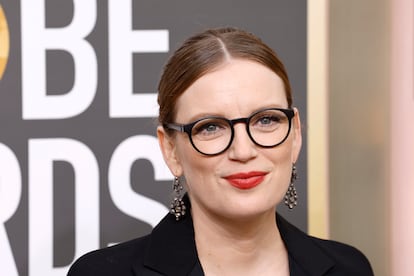

Canadian film director Sarah Polley, 44, had to tamp down her excitement when she learned that she had been nominated for two Oscars. “I had to go to the doctor’s right after, like, literally right after I found out. Yeah... It was a strange [experience]. I didn’t have any expectations,” she explains in a video interview. She is relaxed and settled in front of the elegant headboard of her hotel bed in Los Angeles. That will be her makeshift home until the Academy Awards ceremony on March 12, when which she will discover whether Women Talking, her third film, wins the Oscar for Best Adapted Screenplay or Best Picture. Polley both directed and cowrote the screenplay, adapting fellow Canadian Miriam Toews’s novel of the same name. The Canadian filmmaker is the only woman of the 10 directors nominated.
Starring Frances McDormand, Claire Foy, Rooney Mara and Jessie Buckley, Women Talking is inspired by the true story of sexual assaults in Manitoba’s Bolivian Mennonite community. A court convicted nine men in 2011 of raping dozens of elderly women, women and girls in their group while they slept, sedated by a powerful animal anesthetic. As in Toews’s novel, the film imagines the response of the women in that archaic, agricultural community and what they plan to do when their rapists (cousins, uncles and husbands) return from testifying and are remanded into custody.
Paradoxically, the only female filmmaker nominated in 2023 directed a film that features a Socratic dialogue between women in rebellion against a system in which men always win, monopolize power and deny female agency. No one would dare to accuse Sarah Polley of any of that: she has been an actress, essayist, producer, director and screenwriter. Her life could be the subject of a biopic, a tremendously political one, full of plot twists and turns.
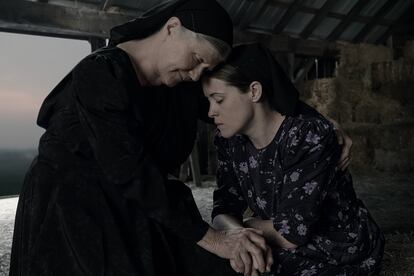
The daughter of British actor Michael Polley and actress and casting director Diane Polley, Sarah entered the industry at the age of four as a Disney actress. At eight, she feared for her life and was traumatized after the chaotic filming of The Adventures of Baron Munchausen under the direction of Terry Gilliam. At 12, she was blacklisted by Disney, with whom she was still working at the time, for wearing a pacifist T-shirt (and refusing to take it off) at an awards ceremony during the Gulf War. Active in political demonstrations since the age of 14, she worked for Atom Egoyan, Michael Winterbottom and Isabel Coixet, among many others. She started directing with Away from Her, a tale based on a short story by Alice Munro starring Julie Christie. After directing Michelle Williams in Take This Waltz (2011), she started her documentary work with Stories We Tell. In it, she revealed that her real biological father is Harry Gulkin, the Canadian producer with whom her mother had an affair.
Polley had been on a decade-long creative hiatus from filmmaking after suffering a concussion in a swimming pool near her Toronto home in the fall of 2015. It was serious enough to have her bedridden for weeks, and she had brain sequelae for years. She recounted part of that experience in her essay collection, Run Towards the Danger, the title of which was inspired by a phrase that her doctor often told her during her recovery: “Don’t settle in the safe zone, run towards the danger.” Polley is more than prepared to keep doing just that.
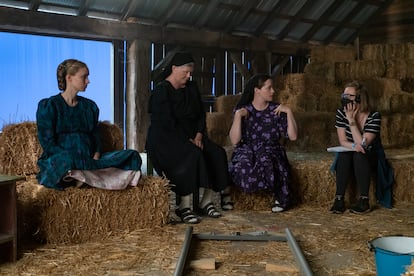
On how she is handling the lead-up to the Academy Awards, Polley says, “I think it’s been a strange, positive experience for me.” “I think [it’s] because I haven’t made a film in 10 or 15 years, I’m finding it so exciting to get to talk to people about the film and get to hear people’s responses in general. And there’s something a bit surreal about that. But I’m almost embarrassed to say I’ve been having so much fun, and I’ve really loved it,” she adds. At the beginning of the interview, she apologizes in case anything she says sounds “uncool.”
Question. On Twitter, instead of promoting your film, you have denounced the fact that female directors like Alice Diop (Saint Omer), Gina Prince-Bythewood (The Woman King) and Chinonye Chukwu (Till) were not nominated.
Answer. This just was such a strong year for female filmmakers and specifically for Black female filmmakers. I guess you just hope that the work gets acknowledged the way it should. But we all know these things don’t always follow logic. I just was very invested and attached to those films and was really excited about it. I think those films will have long lives. This could have been the big year for Black female directors and creators, and it hasn’t been, so this is still a problem in the Academy.
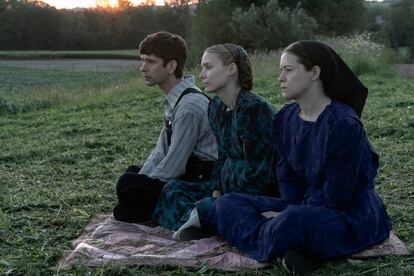
Q. In the film Women Talking, you recover a key phrase from the original novel: “This is a reaction of fiction as an act of female imagination.” In a way, the filming was just that. Is it true that you shortened the shooting day to accommodate families?
A. Yes, but people get really scared about change and so you want to do something that hasn’t been done. Or that’s hard to do. You have to expect a lot of resistance. You have to kind of, like, encourage yourself and prepare yourself to make a case for what you want to do over and over and over again. I’m usually a very controlled filmmaker and kind of executing what I already know I’m going to do. And in this case it just felt like this very alive, fluid process, and we just discovered things every day, which was so exciting.
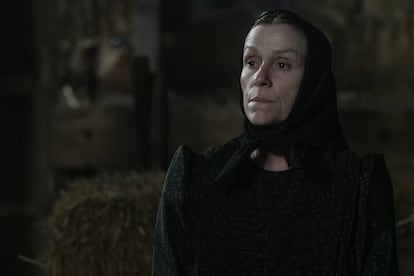
Q. I understand that Frances McDormand, who also produced the film, warned you in her first emails with you that this was also a film about women making movies in a different way.
A. I think that [it] helped [tremendously]to have Frances McDormand [and Dede Gardner] eager to produce it because they are people who are willing to break the rules all the time. They are willing to reinvent the wheel. They’re not scared of change. They’re not scared of doing something new. It’s part of why they’re so successful. I think it’s this ability to shift and be agile. So having them on [our] side was huge. But even asking [to do it was] difficult. You know, I think [it’s like] we [are] asking for something out of the future.
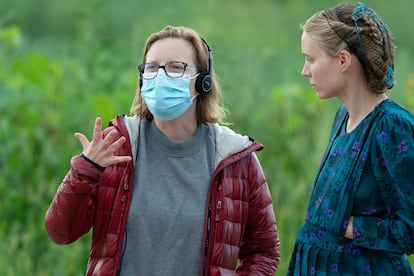
Q. Are you comfortable with Women Talking being labeled a MeToo film?
A. I don’t think of our film as a MeToo movie. I think of it like a kind of timeless movie that’s not even really just about women. What I loved about [the novel Women Talking] when I read it was that I felt like it was this timeless fable that could have been told 40 years ago, and 40 years [from now, it] wouldn’t [be] out of date. When I read it, it was the height of the MeToo movement, and I felt like it was furthering the conversation at that point, making it richer and more complicated. And I think I was really ready for that, to kind of pull back from a bird’s eye view and look at the really messy, tricky questions and also to begin to look forward and [ask] what do we want to build, not just what we want to destroy.
Q. In fact, in the film you probe forgiveness, the validity of pacifism and emphasize that not all men are aggressors.
A. You know, I’m on social media, but not enough to know that “not all men” was a hashtag. I think for me, it was not put in there for political weight, but it’s the point of view of the characters trying to stop them. It’s not even a likable character [who] says not all men. But yeah, of course. I definitely think [it’s] not all men. The big misconception about feminism is that it’s somehow anti-male and, of course, it isn’t, because I don’t think inequality benefits anybody. So, I feel [that] it’s about fairness and equality.
Q. In your essay The Women Who Remained Silent, you wrote about why you didn’t join the four women who denounced the famous radio host Jian Gomeshi for sexual assault three years before MeToo, despite having had a traumatic experience with him. Did you break your silence because you were moved by the novel on which this film is based?
A. I’ve been planning on writing the essay for many, many years. Yeah, I was sort of on and off between the film and the essay.
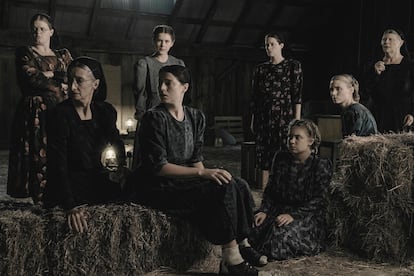
Q. Was it very emotional to shoot this film, or were you able to separate your personal experience from the work?
A. A lot of experiences I’ve had as a woman inform the way I approach the film. It’s all obviously in there and part of how I think about these things, but sadly, like so many [other] women, I’ve had so many experiences that were relevant to this film.
Q. What would you say to those who think Women Talking is just about or for women?
A. It’s about everybody. It’s an important part of the conversation. [There’s] a huge backlash to MeToo right now. I think there’s a lot of really naked, outrageous misogyny that we’re seeing in a very public mainstream way [to the point] that I was, you know, thinking my kids are growing up with more ugly [public] misogynist vitriol than I did. So, it’s strange because I think obviously we’ve progressed a lot as women, but also the backlash is actually really real and really terrifying. It’s a frightening time, and it’s certainly not a time to be letting our guard down or apologizing for making too much progress.
Sign up for our weekly newsletter to get more English-language news coverage from EL PAÍS USA Edition
Tu suscripción se está usando en otro dispositivo
¿Quieres añadir otro usuario a tu suscripción?
Si continúas leyendo en este dispositivo, no se podrá leer en el otro.
FlechaTu suscripción se está usando en otro dispositivo y solo puedes acceder a EL PAÍS desde un dispositivo a la vez.
Si quieres compartir tu cuenta, cambia tu suscripción a la modalidad Premium, así podrás añadir otro usuario. Cada uno accederá con su propia cuenta de email, lo que os permitirá personalizar vuestra experiencia en EL PAÍS.
¿Tienes una suscripción de empresa? Accede aquí para contratar más cuentas.
En el caso de no saber quién está usando tu cuenta, te recomendamos cambiar tu contraseña aquí.
Si decides continuar compartiendo tu cuenta, este mensaje se mostrará en tu dispositivo y en el de la otra persona que está usando tu cuenta de forma indefinida, afectando a tu experiencia de lectura. Puedes consultar aquí los términos y condiciones de la suscripción digital.








































